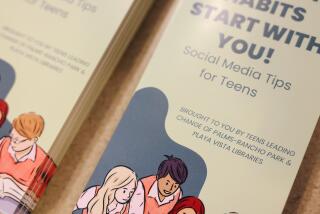Early Life Shapes How We Feel About Our Shapes
- Share via
My sisters and I grew up in a household where unsolicited assessments of our bodies were common. “Thunder thighs” and “two-ton Tessie” jabs came from our brothers. Ample backsides and “big legs,” our father explained, were our genetic destiny, which made me feel doomed. I thought of my lower body as an unwieldy mass of fat. I still see photographs, clothes and exercise through a prism of how it hides, helps or hinders what I think of as my worst body flaws.
And I’m not the only one with a bad-body-image hangover. The percentage of men who dislike their bodies has tripled in the last 30 years, to 43%, according to the authors of “Adonis Complex” (Free Press, 2000), while the percentage of unhappy women has doubled to 56%. Men want bigger muscles. Women want to be thinner.
But how a person views his or her body is a process that starts long before he or she internalizes the images of Arnold Schwarzenegger and Kate Moss as cultural ideals. An infant begins to have an emotional reaction to her own body based largely upon how her primary caretaker responds to it, according to Leonore Tiefer, a New York City clinical psychologist. As a child develops, what she can do and how it feels to inhabit her body commingles with views others express toward her body (i.e. remarks and reactions from siblings, parents and friends).
“Children need to experience their bodies as a force of strength, confidence, usefulness, pleasure and beauty,” said Aline Zoldbrod, author of “Sex Smart: How Your Childhood Shaped Your Sexual Life and What to Do About It,” (New Harbinger Press, 1998). “All of that gets incorporated into their body image.”
Even well-intentioned remarks can sting. When Zoldbrod, a Lexington, Mass., clinical psychologist, noticed her daughter gaining weight, she felt anxious. So when her daughter was leaving for a weekend stay with a family whose ritual was trips to the ice cream parlor, Zoldbrod suggested that her daughter opt for the low-fat ice cream.
“Later, my daughter said, ‘Don’t ever say anything to me about my body in front of another person again,’ ” recalled Zoldbrod. “And I never did.”
Such blunders are born out of parents’ anxiety about their own bodies and an underlying fear that a child will not be attractive, said Zoldbrod, whose family has wrestled with weight problems.
One of Zoldbrod’s clients felt she had to stay thin because her mother had told her that when she gained weight, she gained it in her breasts--and that men don’t like women with large breasts. “This woman was still haunted by that comment in her 30s,” she said. Another patient has such an irrational fear of being heavy that she feels too self-conscious to have sex unless she is a size 6.
For children, a lack of positive remarks can be as damaging as criticism. “Lack of feedback about my looks from my parents made me feel uneasy for many years, with no clear idea of how I looked,” said a Van Nuys woman who asked for anonymity. “I never knew if I was pretty or ugly, fat or all right.”
Even when positive experiences give a child a positive sense about his body, intervening influences can compromise those feelings. “I got the theory that the body is wonderful from my father,” said Thomas Moore, a former Catholic monk and author of “Soul of Sex: Cultivating Life as an Act of Love” (HarperCollins, 1998). “But I got from Catholic school that the body was shameful and that it would be better not to have a body, but to be an angel.”
The messages that children need to internalize are that the body, however it looks, is a magnificent instrument with which to sing, run, leap, dance, climb, touch and feel love. Research shows that women and girls who are active or involved in sports have a better body image than those who don’t. For adults struggling to overcome negative body images, the answer is similar: Focus on what the body can do, rather than on what it looks like.
“You will never criticize your thighs after you climb to the top of a mountain,” said Barbara Harris, editor of Shape magazine who also leads “Body Positive” workshops at the Canyon Ranch Health Resort in Tucson. “When you tap into using your body for greater joy and fitness, you can appreciate your body for the truly great machine it is.”


